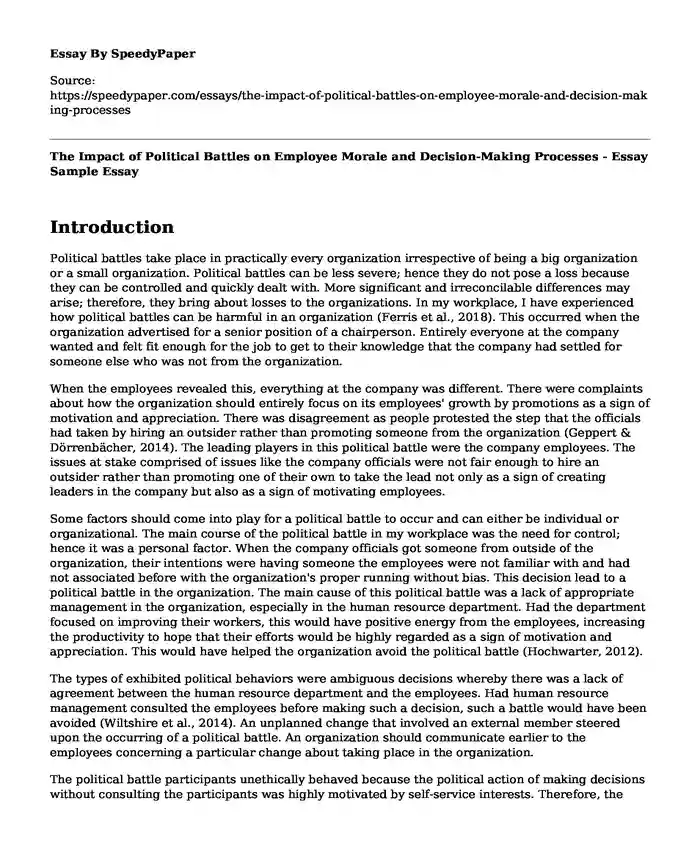
| Type of paper: | Essay |
| Categories: | Company Political science |
| Pages: | 3 |
| Wordcount: | 736 words |
Introduction
Political battles take place in practically every organization irrespective of being a big organization or a small organization. Political battles can be less severe; hence they do not pose a loss because they can be controlled and quickly dealt with. More significant and irreconcilable differences may arise; therefore, they bring about losses to the organizations. In my workplace, I have experienced how political battles can be harmful in an organization (Ferris et al., 2018). This occurred when the organization advertised for a senior position of a chairperson. Entirely everyone at the company wanted and felt fit enough for the job to get to their knowledge that the company had settled for someone else who was not from the organization.
When the employees revealed this, everything at the company was different. There were complaints about how the organization should entirely focus on its employees' growth by promotions as a sign of motivation and appreciation. There was disagreement as people protested the step that the officials had taken by hiring an outsider rather than promoting someone from the organization (Geppert & Dörrenbächer, 2014). The leading players in this political battle were the company employees. The issues at stake comprised of issues like the company officials were not fair enough to hire an outsider rather than promoting one of their own to take the lead not only as a sign of creating leaders in the company but also as a sign of motivating employees.
Some factors should come into play for a political battle to occur and can either be individual or organizational. The main course of the political battle in my workplace was the need for control; hence it was a personal factor. When the company officials got someone from outside of the organization, their intentions were having someone the employees were not familiar with and had not associated before with the organization's proper running without bias. This decision lead to a political battle in the organization. The main cause of this political battle was a lack of appropriate management in the organization, especially in the human resource department. Had the department focused on improving their workers, this would have positive energy from the employees, increasing the productivity to hope that their efforts would be highly regarded as a sign of motivation and appreciation. This would have helped the organization avoid the political battle (Hochwarter, 2012).
The types of exhibited political behaviors were ambiguous decisions whereby there was a lack of agreement between the human resource department and the employees. Had human resource management consulted the employees before making such a decision, such a battle would have been avoided (Wiltshire et al., 2014). An unplanned change that involved an external member steered upon the occurring of a political battle. An organization should communicate earlier to the employees concerning a particular change about taking place in the organization.
The political battle participants unethically behaved because the political action of making decisions without consulting the participants was highly motivated by self-service interests. Therefore, the employees felt that their rights were not respected by human resource managers (Hochwarter, 2012). Additionally, making an organizational change short of the employees' knowledge was not fair-minded enough; therefore, it was unethical for human resource officials to make such a conclusion.
Conclusion
Organizational politics is the foundation of organizational democracy. Some organizations are political, while others are not. Individual features derived from the unique qualities of people employed by the organization and its internal and cultural environment bring about a variation in political strategies. Both personal and organizational factors can bring about great rewards or losses for both the organization and the employees. Politics in an organization provides advice and highpoints how political behaviors reinforce rather than decline the organization's success.
References
Ferris, G. R., Harris, J. N., Russell, Z. A., & Maher, L. P. (2018). Politics in organizations. https://psycnet.apa.org/record/2019-01462-020
Geppert, M., & Dörrenbächer, C. (2014). Politics and power within multinational corporations: Mainstream studies, emerging critical approaches, and suggestions for future research. International Journal of Management Reviews, 16(2), 226-244. https://onlinelibrary.wiley.com/doi/abs/10.1111/ijmr.12018
Hochwarter, W. A. (2012). The positive side of organizational politics. https://psycnet.apa.org/record/2012-03640-002
Wiltshire, J., Bourdage, J. S., & Lee, K. (2014). Honesty-humility and perceptions of organizational politics in predicting workplace outcomes. Journal of Business and Psychology, 29(2), 235-251. https://link.springer.com/article/10.1007%2Fs10869-013-9310-0
Cite this page
The Impact of Political Battles on Employee Morale and Decision-Making Processes - Essay Sample. (2024, Jan 15). Retrieved from https://speedypaper.com/essays/the-impact-of-political-battles-on-employee-morale-and-decision-making-processes
Request Removal
If you are the original author of this essay and no longer wish to have it published on the SpeedyPaper website, please click below to request its removal:
- Free Essay: Strategic Management Exam Questions and Answers
- Free Botanists Essay Example
- Essay Sample: Advantages and Disadvantages of the Electoral College
- Paper Example on Military Intervention in the Post-Cold War Era
- Free Essay: Creating a False Memory
- Geology: Exploring Earth's Processes, Structure, & Chemistry - Essay Sample
- The Nature of Colonial Archives - Essay Sample
Popular categories




